大学英语教案 读写 book 1 Unit3
(完整版)新视野大学英语读写教程第三版第一册教案
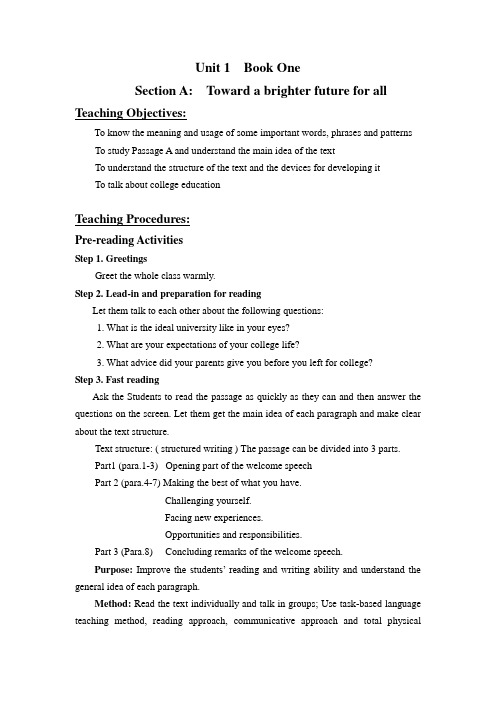
Unit 1 Book OneSection A: Toward a brighter future for all Teaching Objectives:To know the meaning and usage of some important words, phrases and patterns To study Passage A and understand the main idea of the textTo understand the structure of the text and the devices for developing itTo talk about college educationTeaching Procedures:Pre-reading ActivitiesStep 1. GreetingsGreet the whole class warmly.Step 2. Lead-in and preparation for readingLet them talk to each other about the following questions:1. What is the ideal university like in your eyes?2. What are your expectations of your college life?3. What advice did your parents give you before you left for college?Step 3. Fast readingAsk the Students to read the passage as quickly as they can and then answer the questions on the screen. Let them get the main idea of each paragraph and make clear about the text structure.Text structure: ( structured writing ) The passage can be divided into 3 parts.Part1 (para.1-3) Opening part of the welcome speechPart 2 (para.4-7) Making the best of what you have.Challenging yourself.Facing new experiences.Opportunities and responsibilities.Part 3 (Para.8) Concluding remarks of the welcome speech.Purpose: Improve the students’ reading and writing ability and understand the general idea of each paragraph.Method: Read the text individually and talk in groups; Use task-based language teaching method, reading approach, communicative approach and total physicalresponse method.Step 4. Preparation for details of the text on the screenStudents are required to look at the Words and Phrases on the screen and give a brief presentation in class.Words and Phrases:Purpose: Train the Students’ ability of unde rstanding and using foreign language.Method:Talk in groups, Use task-based language teaching method, communicative approach and total physical response method.1. (Para.1)pledge to do sth. 作保证,承诺China and the United states pledge to boost cooperation and exchange to ensure a better future for China-US ties.中美政府承诺将加强合作与交流以确保两国关系的未来更加美好。
新视野大学英语读写教程1(第三版)教案
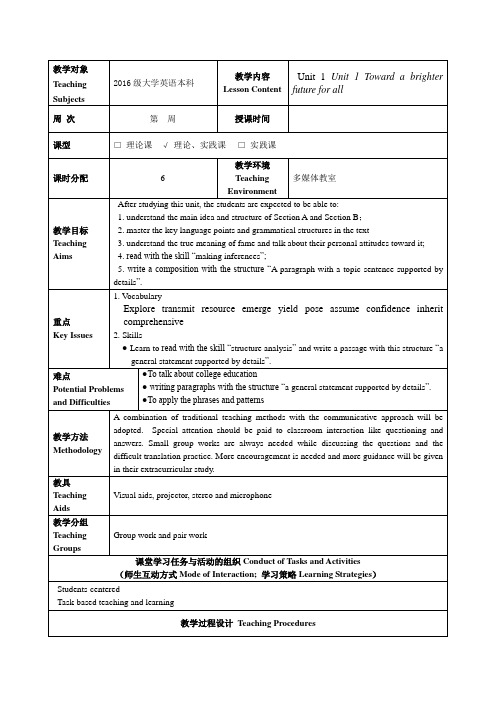
Teaching Aims
After studying this unit, the students are expected to be able to:
1.understand the main idea and structure of Section Aand Section B;
and that their future is built on a solid foundation of the past.
Part II (Paras. 4-7)
The president offers students comprehensive advice on how to make their most of their four college years and makes them realize the university's expectation and their own responsibilities.
II.Listening to a passage and answer questions on page 2
步骤 2Step 2课文学习Section AToward a brighter future for all
I.New words
1.pledge to do sth.
(pledge to /boost cooperation/exchange/China-US ties )
(5).What does the speaker call on students to do at the end of his speech? (Para.8)
4.Analyze text structure
新视野读写读写教程book3 Unit1
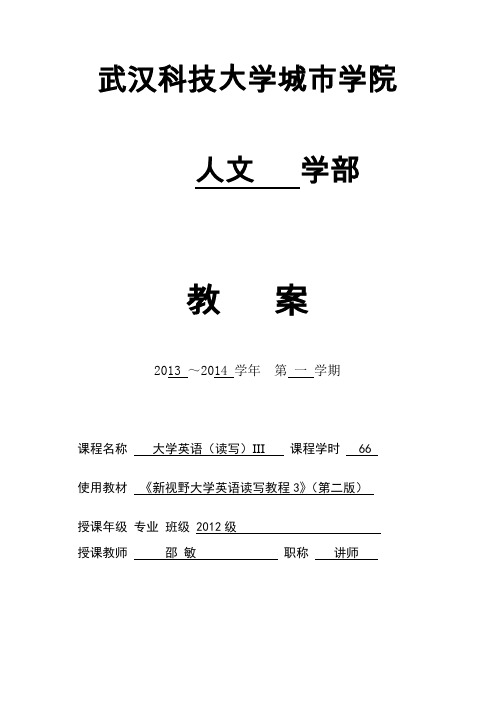
4. Explain exerciseIII
4. Summary and Assignment
思考题或预习题或作业题
1. Recite the words;
2. Finish Exercise IV, VI,…Ⅺ, XIII
参考资料
5. Finish Exercise IV
6. Summary and Assignment
思考题或预习题或作业题
Recite the words and expressions;
Preview Unit3
参考资料
《读写教程3教师用书》
课后小结
本次课
重点与难点
教学
重点
To help students know more about “LOVE”;
Key words: delivery, justice, disguise, penetrate, vacant, long, restrain
教学
难点
The usage of some important words and phrases
20
3. Explain some difficult sentences
15
4. Learn some useful expressions
25
5. Finish Exercise IV
15
6. Summary and AssignBiblioteka ent5教学
过
程
设
计
1. Check Exericse III
2. Read the text and finish Exercise II
新视野大学英语读写3(第三版)优秀教案
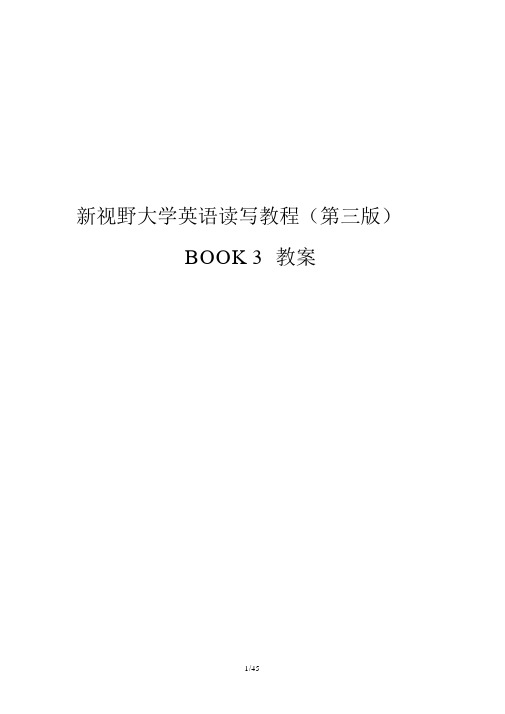
新视野大学英语读写教程(第三版)BOOK 3 教案章节Unit One: The Way to SuccessSection A: New Words and Expressions教案内容Text: Never, ever give up!Exercises: Vocabulary, Sentence Structure,Translation Listening, Speaking & Writing Skills教案目的1.To talk about the secret of success。
2. To further understand the text。
3.To apply the phrases and patterns。
4.To master the essay writing skill。
1. Clearly know the structure of the passage。
2. Master the important language points。
教案要求3.Briefly summarize the passage alone。
4.Correctly use and master the key words in this unit.重点难点1.The structure of the whole passagediscussed and the writing waysmentioned in this passage2.The reading skills mentioned in this unit3.listening practicing related to the contents learned in this unit1.The use of the new words and phrases in this passage2.The writing ways mentioned in this passage3.Some important sentence structures课堂设计Step 1: Lead-in10m Questioning&The Discussing Questioning&First Step 2: Pre-reading Activities10m DiscussingTwoLecturing,PeriodsStep 3: New Words80m Questioning&Giving Examples The Step 1: Background Information10m Questioning& Second DiscussingTwo Step 2: Structure Analysis10m LecturingPeriodsLecturing, Step 3: Language points and Difficult70m Questioning&SentencesGiving ExamplesStep 4: Comprehension of the Text A10m Questioning&DiscussingStep 1: Summarize the passage orally20m Questioning& DiscussingTheStep 2:Exercises (Words in use, WordThird Questioning& building,Banked cloze, Expressions in use,70mTwoTranslation in Section A)DiscussingPeriodsLecturing, Step 3: Revision & Homework10m QuestioningStep 1: Check Homework30m QuestioningTheStep 2:Structured Writing30m Watching &Forth DiscussingTwoStep 3: Listening20m Listening &Periods QuestioningStep 4: Speaking20m Questioning & Discussing教学过程The First Two Periods:Step 1: Lead-in:1.What is success?2.What do you think are the secrets of success?Step 2: Pre-reading Activities:1. Listen to a talk about steps to make your dreams come true. Fill in the blanksbased on what you hear.2. Listen to the talk again and discuss the following questions.Step 3: New WordsThe Second Two Periods:Step 1: Background Information1. Public schools in the UK & US2. Winston ChurchillStep 2: Structure AnalysisPart I (Paras.1-2): By using Winston Churchill’ s story and his speech at Harrow as anintroduction to the topic, the text makes clear its statement: thesecret of success is“ Never give up”.Part II (Paras.3-7): Through the examples of world famous scientists, statesman, andjurist, the text brings forward the statement that only those with astrong will , those who“ keep their eyes on the prize” , and those whoexpend the substantial effort to keep going, will finally succeed.Part III (Paras 8): By reinforcing the statement given in part II, the text draws theconclusion that with hard work, determination, dedication andpreparation, you can transcend any handicap, accomplish any feat,and achieve success.Step 3: Language points and Difficult SentencesPractical Phrases1. deviate from ⋯偏离,背离⋯⋯2. preclude sb. from doing阻止某⋯人做⋯⋯3. triumph over战胜⋯⋯⋯4. in (the) pursuit of追⋯求⋯⋯5. work one’ s 。
现代大学英语第一册教案unit3

现代⼤学英语第⼀册教案unit3Lesson Three Message of the LandI. Teaching ObjectivesExplain the style of interviews;Make the students re-think the changes in social values, attitudes, and life styles with the development of industrialization;Explain two word-formation skills:○a Noun/V+ …ful Adj○b…Un?+ Adj AntonymIntroduce some cultural differences in translation to arouse the students? awareness of these phenomena;II. Teaching Process2.1I ntroduction to the TextThis text is different from the previous two, which are both stories. Our present text is an essay in a very broad sense of the word, for it was written down by the writer who interviewed a farmer and his wife. Since the end of World War II it has become popular for writers to interview people, record what they say and, after some, not too much, editing, publish these people?s stories in book form.The style of such “writing” is colloquial. The language is straightforward. The sentences are generally short. When we read the text, we feel as if we were sitting face to face with the couple, listening to their stories and experiences, sharing joys and sorrows.Do you know what these nicknames refer to?Land of the Rising Sun Land of the Rose Land of the Shamrock Land of Cakes Land of Golden Fleece Land of Thistle Land of the stars and stripesShamrock [′??mr ?k] 三叶草(爱尔兰的国花)Fleece ⽺⽑Thistle [′θ?s ?l] 苏格兰的国徽stripe[stra ?p] 条纹AuthorPira Sudham is considered Thailand's leading English language writer, who was nominated 提名 for the 1990 Nobel Prize for Literature. His literary works are concerned with social-economic-political changes occurring in Thailand. Widely read and highly acclaimed, his books have given an expedient voice to the poor and the voiceless.Bangkok, population 8,538,610 (1990), is the capital and largest city of Thailand. The city is located on the east bank of the Chao Phraya River, near the Gulf of Thailand. Bangkok is one of the fastest-growing, most economically dynamic and socially progressive cities in Southeast Asia. It is also one of the world's most popular tourist destinations. Bangkok is the economic center of Thailand.The city contains many Buddhist 佛教temples. Buddhism Scotland Japan U.S.A Ireland England Australiais Thailand's main religion. 94% of Thai people are Buddhist. The other are Muslim, Catholic罗马天主教的or Chinese. Monks are more suited to reach enlightenment because they follow a strict way of life far from material attachment. Their life is based on 227 monastic rules and 5 major precepts, i.e. no sex, no lies, no robbery, no alcohol, no killing.In a temple, some men have been monks for decades but there are also some men who became monk only a short time ago. They do it in order to bring merit to their parents ("THAM BUN"). A boy is not a man if he hasn't been a monk once in his life. Even the King of Thailand Rama 9had been a monk for one month. In old days this period was three months. Now it can be only a few weeks or a few days. Some families still refuse to marry their daughter if the future husband hasn't ever been amonk. It means that he isn't ripe enough.In a bus, seats in the back are reserved to monks. If a woman is sitting there, she should leave because a woman cannot touch a monk.2.2 Main Parts of Text APart One (P1 to P7): This part is the wife?s attitudes, and can be further divided into two small sections. Section One, from Paragraph 1 to Paragraph 3, mainly tells us about her family members and how their children left. Section Two, from Paragraph 4 to Paragraph 7, deals with the changes that the wife cannot adjust to.Part Two (P8 to P11): This part is the husband?s views. The man?s speech is shorter but touches something deeper --- what he thinks are the roots of all evils. He also tells us what joys he finds in life and in farming.2.3 Detailed Discussion of the Textto belong to sb: to be owned by sb.eg: Who does the Mobil phone belong to?It was I who stayed with my parents till they died.(1)Learn how to use the emphatic form “it is/was…that/who…”Eg. It was my sister who went to teach in a village school upon graduation.My husband moved into our house as is the way with usin Esarn. (1)(When we got married) my husband came to live in our house. It was the tradition here in Esarn that the bridegroom新郎should come to live with the bride?s family.Q: how is the custom in Esarn different from Chinese tradition?In traditional Chinese families, usually it is the daughter who will leave her parents after getting married and move into the husband?s family. Therefore, traditionally, daughters have no rights to inherit the property of their parents? family. In Esarn, it seems to be the opposite.“as” in a relative clauseAs is known to all, China first created the use of compass.( as – subject of the clause)In a bus, seats in the back are reserved to monks. If a woman is sitting there, she should leave because a woman cannot touch a monk.infancyn. a. early childhood婴⼉期b. early stage of development or growth初期,摇篮期In the past, many children died in infancy.基因的;遗传的;Genetic engineering is still in its infancy.a. infantile[′?nf(?)nt??l] 婴⼉的,幼⼉的n. infant幼⼉;婴⼉In the past, many children died in infancy.The rest, two boys and two girls, went away (1)Our other children –two boys and two girls left as soon as we had the money to buy them jeans.“to buy jeans for them”在这⾥具有⼀种象征意义,象征着孩⼦们刚⼀长⼤,条件刚⼀允许,他们就⽴即离开了家。
21世纪大学英语-课程教案-book1
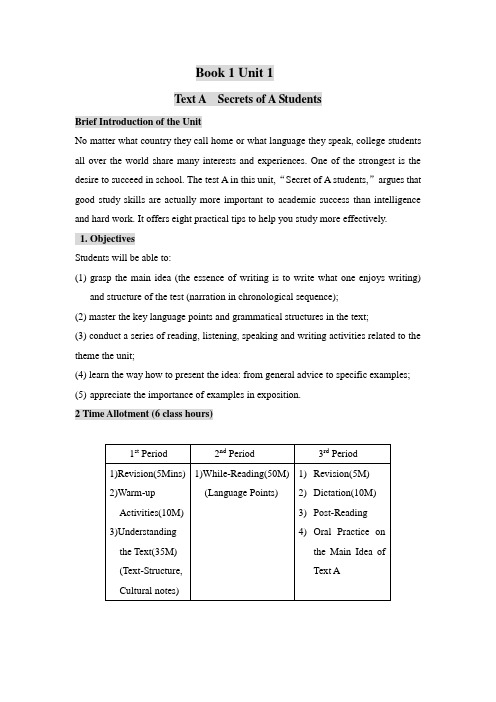
Book 1 Unit 1Text A Secrets of A StudentsBrief Introduction of the UnitNo matter what country they call home or what language they speak, college students all over the world share many interests and experiences. One of the strongest is the desire to succeed in school. The test A in this unit,“Secret of A students,”argues that good study skills are actually more important to academic success than intelligence and hard work. It offers eight practical tips to help you study more effectively.1. ObjectivesStudents will be able to:(1)grasp the main idea (the essence of writing is to write what one enjoys writing)and structure of the test (narration in chronological sequence);(2) master the key language points and grammatical structures in the text;(3) conduct a series of reading, listening, speaking and writing activities related to the theme the unit;(4) learn the way how to present the idea: from general advice to specific examples;(5)appreciate the importance of examples in exposition.2Time Allotment (6 class hours)3 Warm-up Activities(1) Based on the title, guess what the text is about.(2) Arrange the students in group of 4-6, depending on the size of the class; each group elects a chairman, a recorder and a speaker, and introduce the discussion topics;(a) What does your group like or dislike about English?(b) What are the greatest problems your group has in English study?(c)What methods do you think are good in your English study?4Text StructuresThis text is divided into three parts.The first part (1-3paragraph) tells us why A students do well in their study, even if they actually put in fewer hours than their lower-scoring classmates.The second part (4-11) shows us secrets of A students which include eight skills; concentrate, study anywhere, organize your materials, organize your time, learn how to read, take good notes, ask questions, and study together.The third part is to encourage all the students to learn and master the secrets in order to become A students.5 Cultural notes1) grading systemSchool, colleges and universities in Great Britain and the United States commonly use letter grades to indicate the quality of a student’s academic performance: A(excellent), B(good), C(average), D(below average), and F(failing). In the United States, work rated C or above is usually required of an undergraduate student to continue his/herstudies; work rated B or higher is usually required of a graduate student to continue. In percentage scales, 100 percent is the highest mark, and 70 percent (or 65 percent) is usually the lowest passing mark.2) students at universitiesA university student who has not yet taken his or her first, or “bachelor’s” degree is an undergraduate. In the United States, a first-year student at a college or university, and in a high school as well, is called a freshman, a second-year student a sophomore, and a third-year student a junior, and a fourth-year student a senior. A student is a person who has completed a university degree course while a postgraduate (or graduate in the United States) is a person doing studies that are done at a university after one has received a first degree.6 Language Study1) Word-processingA) perform: (vi/t) do (a piece of work, sth one is order to do, sth one has agreed to do) 做,履行,完成; 演出,表演Examples:a)As a top student, she performs extremely well in every lesson.b)State-owned industries more often than not perform poorly.Derivative:a) performance:(n) [sing] process or manner of performing做,履行,完成; 演出,表演·To be faithful in the performance of his duties.Differences: act and performAct: 表示“充当、扮演或演出”,主要指演员在电影、戏剧中扮演角色,主语既可为演员,也可为电影、剧本等。
大学英语精读第三版第一册Book1Unit3答案

大学英语精读第三版(上海外语教育出版社董亚芬主编)第一册Book1 Unit3答案1) present2) decade3) content4) arrange5) minor6) efficient7) endure8) extra9) reluctantly10) tremble1) bunch2) packet/pack3) piece4) pair5) piece6) bunch7) pair8) piece9) bunch10) packet11) pair12) piece1) at other times2) After all3) efficient4) endure5) extra extra6) round the corner7) occasions8) minor9) arranged10) primary11) rare12) trembling13) reluctantly14) disappointment1) can endure2) on the occasion of3) to pick it up4) are not sure of5) felt a pang of disappointment6) Not being content1) milkman2) fireman3) fisherman4) businessman6) spaceman7) weatherman8) sportsman1) broadens2) widened3) quicken4) darkened5) sharpening6) shortens1) excitement2) excited3) exciting4) excitedly5) excited6) excited1) disappointed2) disappointing3) disappointed4) disappointment5) disappointed1) patience2) patient3) patiently1) reluctant2) reluctance3) reluctantly4) reluctant1) efficiency2) efficient3) efficiently4) efficient1) contents2) content3) content/contented4) content5) contented6) content7) contents8) content1) The bottle is too small to hold so much water.2) He was too tired to go any further.3) He is too proud to see his own shortcomings.4) It is too late for the bookstore to be open.5) They did not stop working until it became completely dark.6) He did not come until the meeting was over.7) He said he would not get married until he had found a satisfactory job.8) He did not go to bed until he had finished his reading assignment.1) occasion2) endured3) rare4) postman5) trembled6) After all7) at other times8) disappointmentA1) necessary2) and3) with4) The5) of6) in7) growing8) if9) one10) through11) when12) continueB1) present2) any/those3) could4) sing5) sent6) cost7) birthday8) bird9) replied1) journey2) shocked3) funeral4) While there5) conversations6) thoughts7) provide8) dozens9) over and over10) meant翻译1) 那位名演员似乎很乐意在剧中扮演一个次要角色。
新视野大学英语1读写教程Unit1 3 4课后练习汉译英参考译文
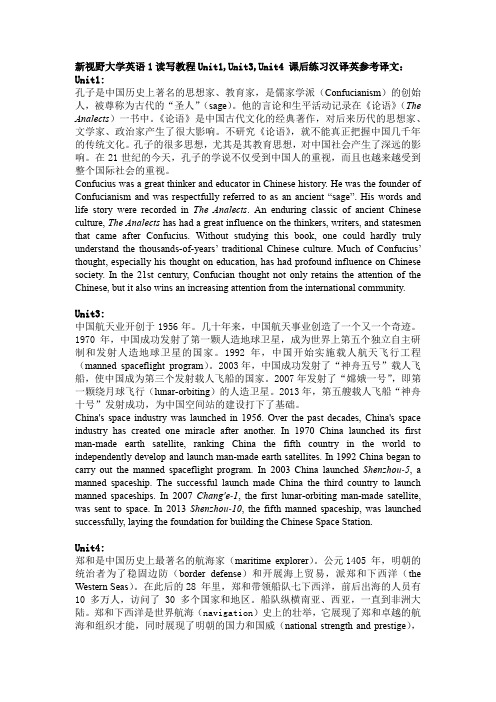
新视野大学英语1读写教程Unit1,Unit3,Unit4 课后练习汉译英参考译文:Unit1:孔子是中国历史上著名的思想家、教育家,是儒家学派(Confucianism)的创始人,被尊称为古代的“圣人”(sage)。
他的言论和生平活动记录在《论语》(The Analects)一书中。
《论语》是中国古代文化的经典著作,对后来历代的思想家、文学家、政治家产生了很大影响。
不研究《论语》,就不能真正把握中国几千年的传统文化。
孔子的很多思想,尤其是其教育思想,对中国社会产生了深远的影响。
在21世纪的今天,孔子的学说不仅受到中国人的重视,而且也越来越受到整个国际社会的重视。
Confucius was a great thinker and educator in Chinese history. He was the founder of Confucianism and was respectfully referred to as an ancient “sage”. His words and life story were recorded in The Analects. An enduring classic of ancient Chinese culture, The Analects has had a great influence on the thinkers, writers, and statesmen that came after Confucius. Without studying this book, one could hardly truly understand the thousands-of-years’ traditional Chinese culture. Much of Confucius’ thought, especially his thought on education, has had profound influence on Chinese society. In the 21st century, Confucian thought not only retains the attention of the Chinese, but it also wins an increasing attention from the international community. Unit3:中国航天业开创于1956年。
新视野大学英语第三版读写教程第一册unit3-讲义
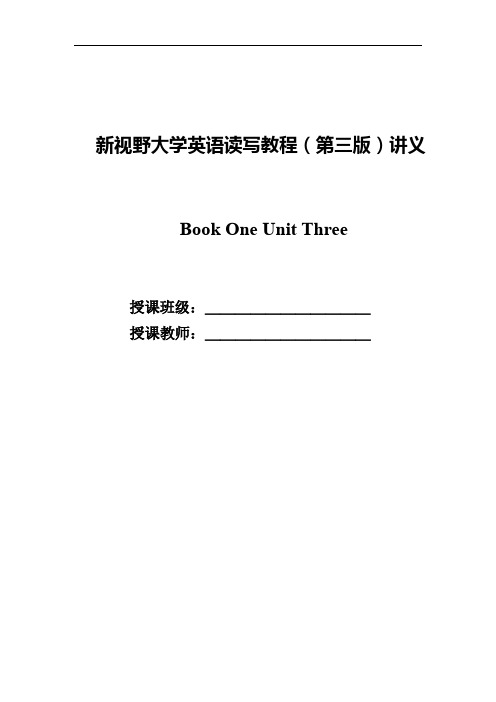
新视野大学英语读写教程(第三版)讲义Book One Unit Three授课班级:___________授课教师:___________I. Warming-up Activities1. Preview and Lead-in (p60)1). What are the advantages and disadvantages of each way of teaching and learning?Traditional classroomAdvantages:· more direct communication between teachers and students;· a better learning atmosphere.Disadvantages:· little interaction either among students or between students and the teacher;·teachers tending to dominate the class;·writing on blackboard reducing efficiency.Multimedia classroomAdvantages:· more vivid teaching materials;· students better engaged in classroom learning.Disadvantages:·too many distractions with too many pictures and videos in multimedia classrooms.Studying online in the dormAdvantages:·being able to choose when and what you want to learn;·easy access to the wide range of online informationDisadvantages:· making it easier for students to copy answers from the Internet;· lack of face-to-face communication between the teacher and student;·the possibility for students to develop Internet addiction.2). Which way do you prefer? Give your reasons.I prefer the multimedia way of learning:· it is vivid with teaching materials presented in different ways· Compared with traditional classroom, it is more interesting.I prefer to study online:·manage my own time·have my own properties·do things at my own pace3). Do you think the Internet is indispensable in teaching and learning nowadays? Why or why not?The Internet is indispensable:· get access to the latest development of teaching and learning;· enjoy many interesting online courses· communicate with teachers after classThe Internet is not indispensable:· teaching and learning have been carried out long before the Internet came into being;· teaching and learning could surely continue without the Internet.2. Background Information (教参p )Wi-FiWi-Fi (or WiFi) is a local area wireless technology that allows an electronic device to participate in computer networking. It is defined as any “wireless local area network (WLAN) product based on the Institute of Electrical and Electronics Engineers’ (IEEE) 802.11 standards”. However, the term “Wi-Fi” is used in general English as a syn onym for “WLAN” since most modern WLANs are based on these standards.Many modern devices can use Wi-Fi, e.g. personal computers, video-game consoles, smartphones, digital cameras, tablets and digital audio players. These can connect to a network resource such as the Internet via a wireless network access point. Such an access point (or hotspot) can cover an area as small as a single room with walls that block radio waves, or as large as many square kilometers by using multiple overlapping access points.Wi-Fi allows cheaper deployment of local area networks (LANs). Spaces where cables cannot be run can also host wireless LANs. Manufacturers are building wireless network adapters into most laptops. The price of chipsets for Wi-Fi continues to drop, making it an economical networking option included in even more devices. Different competitive brands of access points and client network interfaces can inter-operate at a basic level of service.Many traditional university campuses in the developed world provide at least partial Wi-Fi coverage. Carnegie Mellon University built the first campus-wide wireless Internet Network at its Pittsburgh campus in 1993. By February 1997 the CMU Wi-Fi zone was fully operational. Many universities collaborate in providing Wi-Fi access to students and staff through the eduroam (education roaming) international authentication infrastructure.LaptopA laptop (also known as a notebook) is a portable personal computer designed for mobile use small enough to sit on one’s lap. A laptop is made up of a large number of components that all must function well in order for your computer experience to be complete, which include a display, a keyboard, a pointing device (a touchpad, also known as a trackpad, and/or a pointing stick), speakers, as well as a battery, into a single small and light unit.Most laptops are designed in the flip form factor to protect the screen and the keyboard when they are closed. And modern “tablet” laptops have a complex joint between the keyboard housing and the display, permitting the display panel to twist and then lay flat on the keyboard housing. They usually have a touchscreen display and some include handwriting recognition or graphics drawing capability.Laptops were originally considered to be “a small niche market” and were thought suitable mostly for “specialized field applications” such as “the military, the Internal Reven ue Service, accountants and sales representatives”. But today, there are already more laptops than desktops in businesses, and laptops are becoming obligatory for student use and more popular for general use.SmartphoneA smartphone (or smart phone) is a mobile phone with an operating system.The majority of smartphones run on Apple iOS or Google Android, and many others useWindows Phone or BlackBerry OS. Smartphones typically include the features of a phone with those of other popular mobile devices, such as personal digital assistants and GPS navigation units. Usually they have a touchscreen interface and can run 3rd-party apps.With a smartphone, one can not only make phone calls, but also send and receive emails, and edit Office documents. But what makes smartphones so popular is that they can access the web at higher speeds, thanks to the growth of 3G and 4G data networks, as well as the Wi-Fi support. But as the technology is constantly changing, what constitutes a smartphone today may change by next week, next month, or next year. Stay tuned!3. Pre-reading Activities (Compound dictation)1)This is the VOA Special English Education Report.But it also depends on the interest and ___________ of the teachers, and the goals and budgets of the schools. Schools are almost all _____________ to the Internet. But some have more technology, and use it more, than others.For example, some schools use computers for _____________ like video conferencing, to bring the world into the classroom. And some classrooms ___________________ things like a Smart Board, a kind of interactive whiteboard. Interactive whiteboards are large ___________ for presentations.They connect to a computer and can ___________ by touch. They can be used for documents or writing or to ________ video. Some teachers are trying _________ new ways to teach with devices like iPods and mobile phones. But educators say the most important thing, as always, is the ________.2)You are listening to As It Is, from VOA Learning English. I’m Catherine Cole.American colleges are facing what some people are calling a “______________” of problems. College costs are rising, and there are not enough jobs for all the students completing study programs. Yet ___________ say they cannot find enough workers with technical skills. Finding a solution to these problems can be difficult. But, as Avi Arditti reports, one solution may be found in the ___________ number and quality of online classes.Such classes might ____________ colleges the way the Internet has already changed music, publishing, sales and other businesses.At most colleges, a professor or ___________________ gives a lecture to students, who then do research, study, and homework alone. Student and __________ John Haber says online classes change everything around. “They’re watching the lectures at home as homework, recorded lectures, and then when they get to class, they’re having more active discussions, or ______________ with the teachers or working on projects.”Experts say the new technology will have a major effect on colleges. Somepredict future classes may be a __________ of online lectures and professors helping students work through difficult problems in person.Georgetown University _________________ Tony Carnevale says he would welcome these changes. He says a college education has to be less _________ and lead to skills needed by employers.I’m Avi Arditti.I’m Catherine Cole. That’s our show for today.4. Topic-centered study of new words and their use1.Upon completion of this course, the successful student will be able to write a____________ Android app.2.Discussions for this year’s _________ are likely to include higher fuelcharges.3.I used to have a __________ about my looks.4.Jane was part of a team that had struggled hard to finish a difficult____________.5.Her center is __________ of many across the country–a non-profitorganization that cares for about 50 children.6.Those who have an ____________ complex feel that they are of less worth orimportance than others.7.His good personality made him popular with his ________.8.This inexpensive art projector is easy to use, light in weight, __________ andgives a sharp image.9.Please sit down and _________ why you feel so upset.10.The hotel offers a high standard of service at very ____________ rates.II. Vocabulary Study1. transform vt. 使改观,使变形,使转化They were trying their best to transform their university into a top school in the country.Increased population has transformed the landscape.transformation n. (彻底的)改变,改观In recent years, the movie industry has undergone a dramatic transformation.近些年,电影业经历了巨大的变革。
新视野大学英语第三版读写教程Book1-Unit1-电子教案

Unit 1 Fresh StartText A Toward a Bright Future for AllBefore readingBefore reading Text A, you may need to know the following things to help you with a better understanding.American higher educationIn the United States, students can choose to go to college after high school. (They can also choose to go straight to the workforce after high school.) They have the option of attending a two-year community college before applying to a four-year university. Admission to community college is easier, tuition is lower, and class sizes are often smaller than at a university. Community college students can earn an associate degree and transfer up to two years of course credits to a university.College and university students need to pay tuition, but many earn scholarships or receive loans. Although admissions policies vary from one university to another, most determine admission based on several criteria, including a student's high school course of study, high school Grade Point Average (GPA), participation in extracurricular activities, SAT (Scholastic Assessment Test) or ACT (American College Testing) exam scores, a written essay, and possibly a personal interview with a representative from the admissions office.Most students in the United States take the SAT Reasoning Test or the ACT during their final year of high school. Each university sets a minimum SAT or ACT score that a student must achieve in order to gain admission. These are standardized quantitative examinations. The SAT tests critical reading, mathematics, and writing skills. The ACT tests English, mathematics, reading, science reasoning, and includes an optional writing test.Extracurricular activities may include scholastic clubs, athletic teams, student government, and philanthropic clubs. V oluntary participation in these kinds of activities is an indication that a student has learned valuable life lessons, such as teamwork, leadership, or civic responsibility.University students pursuing a bachelor's degree are called "undergraduates"; students pursuing a master's or doctoral degree are called "graduate students". Most universities give undergraduate students a liberal education, which means students are required to take courses across several disciplines before they specialize in a major field of study. Graduate and professional programs, such as medicine or law, are specialized. All degree programs require students to complete a minimum number of credit hours before graduating.Selection for admission to a graduate program is based on several criteria. These include completion of a bachelor's degree, the student's undergraduate coursework and GPA. Students are also expected to write an essay as part of their application or to submit a writing sample. Most master's programs require students to have a minimum score on the Graduate Record Examination(GRE), which tests verbal reasoning, quantitative reasoning, critical thinking, and analytical writing skills.Students continue to take courses at the graduate level. A final thesis is required for most master's programs. Doctoral students take courses until they have earned enough credit hours to attempt their qualifying examinations. These are usually taken over several days and often include a written and oral component. After doctoral students pass their qualifying exams, they are advanced to candidacy and can begin writing their dissertation. Before the degree is given, the completed dissertation must be orally defended before the candidate's faculty committee.Vera WangVera Wang (王薇薇, 1949- ) is aChinese-American fashion designer. Shewas born and raised in New York City.While trained as a figure skater in highschool, she eventually earned a degree in arthistory from Sarah Lawrence College in1971. But a career in fashion was her dream.She worked as a senior fashion editorfor Vogue magazine for 15 years. In 1985,she left Vogue and joined Ralph Lauren as adesign director for two years. In 1990, she opened her own design salon in New York, and featured her trademark bridal gowns. Wang has made wedding gowns for many celebrities and public figures, such as Jennifer Lopez (珍妮弗•洛佩兹), Sharon Stone (莎朗•斯通) and Chelsea Clinton (切尔西•克林顿).Detailed study of the textPara.1. Good afternoon! As president of the university, I am proud to welcome you to this university. Your achievement is the triumph of years of hard work, both of your own and of your parents and teachers. Here at the university, we pledge to make your educational experience as rewarding as possible.下午好!作为校长,我非常自豪地欢迎你们来到这所大学。
新视野大学英语第三版读写教程Book1--Unit3电子教案
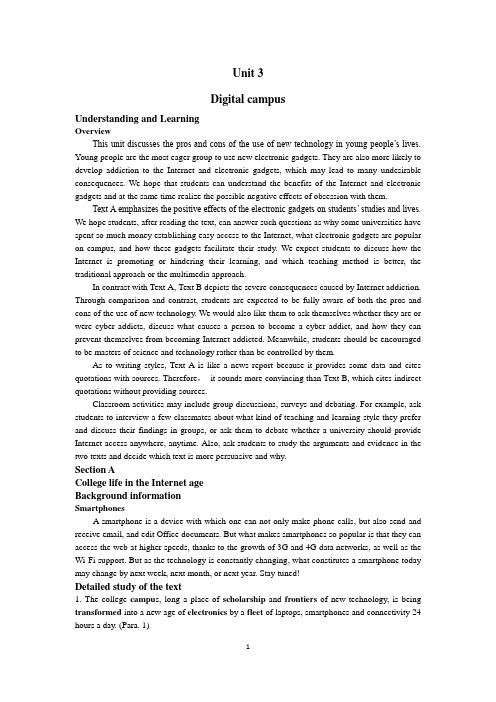
Unit 3Digital campusUnderstanding and LearningOverviewThis unit discusses the pros and cons of the use of new technology in young people’s lives. Young people are the most eager group to use new electronic gadgets. They are also more likely to develop addiction to the Internet and electronic gadgets, which may lead to many undesirable consequences. We hope that students can understand the benefits of the Internet and electronic gadgets and at the same time realize the possible negative effects of obsession with them.Text A emphasizes the positive effects of the electronic gadgets on students’ studies and lives. We hope students, after reading the text, can answer such questions as why some universities have spent so much money establishing easy access to the Internet, what electronic gadgets are popular on campus, and how these gadgets facilitate their study. We expect students to discuss how the Internet is promoting or hindering their learning, and which teaching method is better, the traditional approach or the multimedia approach.In contrast with Text A, Text B depicts the severe consequences caused by Internet addiction. Through comparison and contrast, students are expected to be fully aware of both the pros and cons of the use of new technology. We would also like them to ask themselves whether they are or were cyber addicts, discuss what causes a person to become a cyber addict, and how they can prevent themselves from becoming Internet-addicted. Meanwhile, students should be encouraged to be masters of science and technology rather than be controlled by them.As to writing styles, Text A is like a news report because it provides some data and cites quotations with sources. Therefore,it sounds more convincing than Text B, which cites indirect quotations without providing sources.Classroom activities may include group discussions, surveys and debating. For example, ask students to interview a few classmates about what kind of teaching and learning style they prefer and discuss their findings in groups, or ask them to debate whether a university should provide Internet access anywhere, anytime. Also, ask students to study the arguments and evidence in the two texts and decide which text is more persuasive and why.Section ACollege life in the Internet ageBackground informationSmartphonesA smartphone is a device with which one can not only make phone calls, but also send and receive email, and edit Office documents. But what makes smartphones so popular is that they can access the web at higher speeds, thanks to the growth of 3G and 4G data networks, as well as the Wi-Fi support. But as the technology is constantly changing, what constitutes a smartphone today may change by next week, next month, or next year. Stay tuned!Detailed study of the text1. The college campu s, long a place of scholarship and frontiers of new technology, is being transformed into a new age of electronics by a fleet of laptops, smartphones and connectivity 24 hours a day. (Para. 1)Meaning: For a long time, the college campus has been a place to provide education and produce most advanced new technology. But it is now being completely changed into an electronic-age hot spot by the wide use of laptops, smartphones, and access to the Internet 24 hours a day.★campus: n. [C, U] the land and buildings of a university or college (大学或学院的) 校园All freshman students live on campus. When they are in their second year at college, they may live off campus. 所有大学一年级的学生都住在校园里。
新视野英语教程教案book1unit3A
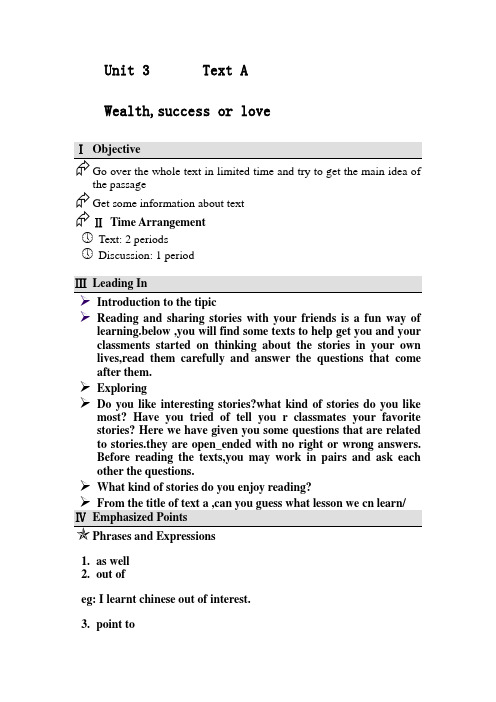
Unit 3 Text AWealth,success or loveⅠObjectiveG o over the whole text in limited time and try to get the main idea ofthe passageG et some information about textⅡTime ArrangementText: 2 periodsDiscussion: 1 periodⅢLeading InIntroduction to the tipicReading and sharing stories with your friends is a fun way of learning.below ,you will find some texts to help get you and your classments started on thinking about the stories in your own lives,read them carefully and answer the questions that come after them.ExploringDo you like interesting stories?what kind of stories do you like most? Have you tried of tell you r classmates your favorite stories? Here we have given you some questions that are related to stories.they are open_ended with no right or wrong answers.Before reading the texts,you may work in pairs and ask each other the questions.What kind of stories do you enjoy reading?P hrases and Expressions1.as well2.out ofeg: I learnt chinese out of interest.3.point to4.fill with/ be filled with5.jump in6.take someone’s advice1.1. People have differing views on this.Meaning: People hold different points of view about this question.2. Some think wealth is more important; some success; othersthink love is the most important of all.Meaning: Some people believe that wealth is more important;some people regard success as more important; other people hold the view that love is most importantsome success = some think success is more important3. But is there a third way?Meaning: But is it possible that a third way exists?4. Could it be possible for a person to choose one and somehowget the other two, as well? (Para.1)Meaning: Could there be a possibility for a person to pick one and get the other two as well by some means?5. A woman came out of her house and saw three wise men withlong white hair sitting in her front garden.Meaning: A woman came out of her house and saw three clever men sitting in her front garden. They all had long white hair.6. Out of sympathy, she said...Meaning: Feeling pity for the old men, she said...7. I don't think I know you, but you must be hungry.Meaning: I don't know any of you, but I'm sure you are hungry.Note that the word "must" indicates that the woman was very sure that the old men were hungry.8. "Is the man of the house at home?" they asked.Meaning: "Is the master/host of the house at home?" they asked.Please notice that the view—the man of the house is the master of the house—is not acceptable to all, at least not to feminists.9. "Then we cannot come in," they replied.Meaning: "In this case, we can't come in," they answered.then = in this case; under this condition10. In the evening when her husband came home, the woman told him exactly what had happened.Meaning: In the evening when her husband came home, the woman told him what had happened, bit by bit.11. "We do not go into a house together," they replied. Meaning: "It's our usual practice that we do not enter a house together," they answered.12. "Why is that?" she wanted to know.Meaning: "What's the reason for your not entering a house together?" she asked for an answer.13. Let him come in and fill our home with wealth!Meaning: Ask him to come in and fill up our house with money and possessions!fill... with.../ be filled with...: make or become full注满;填满;装满The room was filled with laughter and we all had a good time.屋子里充满了笑声,我们都玩得很开心。
新视野大学英语(第三版)读写教程Book1-Unit9电子教案
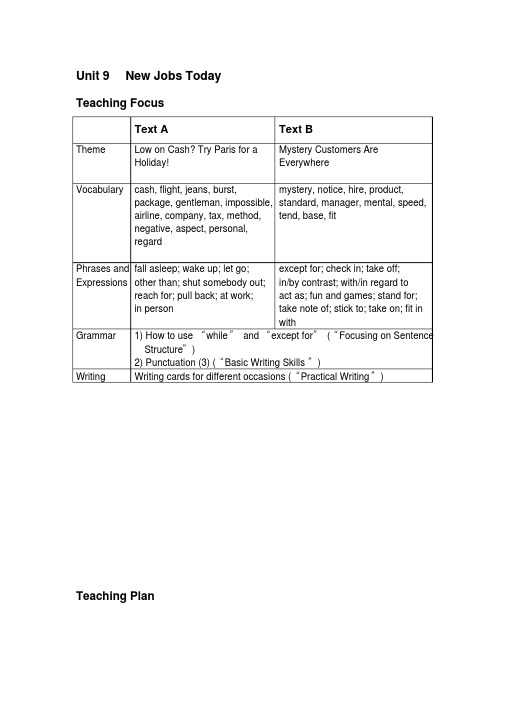
Structure”)
2) Punctuation (3) (“Basic Writing Skills ”)
Writing
Writing cards for different occasions (“Practical Writing ”)
Teaching Plan
单元 主题
New Jobs Today
reach for; pull back; at work;
act as; fun and games; stand for;
in person
take note of; stick to; take on; fit in
with
Grammar 1) How to use “while ” and “except for” (“ Focusing on Sentence
why not? 3) Why is it important for a mystery shopper to be exact? 4) What does C.H.A.M.P.S. stand for? 5) What high-tech devices are mystery shoppers armed with
课后学习设计
Finish all the exercises in Unit Nine. Read the passage in Reading Out on Page 149 of SB and recite it. Write an English Christmas card and a birthday card to your friend studying in another city .
新视野大学英语读写教程3(第三版)Unit3_教案
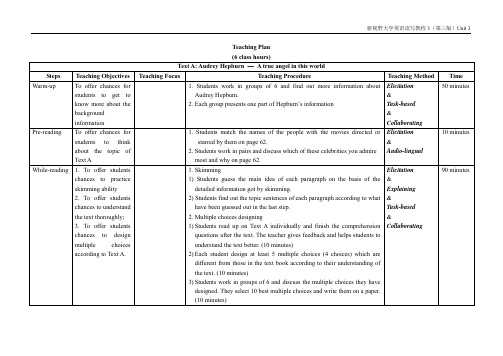
have been guessed out in the last step. 2. Multiple choices designing 1) Students read up on Text A individually and finish the comprehension
Using signal words properly
4) Every two groups exchange the multiple choices they have designed. Students in groups work together and finish the 10 multiple choices the other group has designed. (8 minute)
2. Students work in pairs and discuss which of these celebrities you admire most and why on page 62.
1. Skimming 1) Students guess the main idea of each paragraph on the basis of the
Language points: Vocabulary: ①Words for reading: Students work in pairs and read the text again to
underline a maximum of six words or phrases they don’t understand. Once chosen students show their words/phrases to their partner to see whether they can help in guessing meanings out. Finally, they are allowed to look up their words in the dictionaries and record both the words and the meanings. ②Exercises: Language focus ③Quiz: old to new 1. The teacher checks the writing work of students before giving feedback 2. The teacher concludes and provides feedback in general 3. Students check by themselves according to the feedback and make self-evaluation 4. Students check works of their peers according to the feedback and make evaluation
新视野英语教程读写教程book_1_unit_3
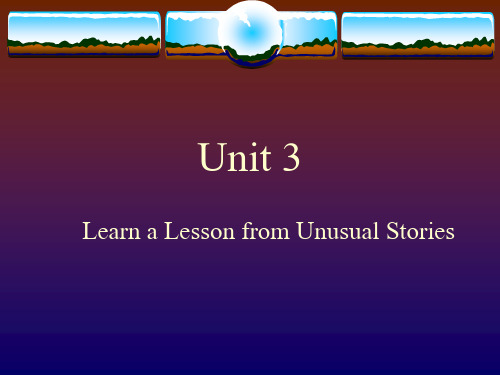
II. Complete each sentence with the correct form of
❖ Creating buzz is similar in some ways to good storytelling. You build suspense by withholding information and releasing it gradually. You deliver the punch line at the right point in the story. You create characters that grab the audience's imagination. In this chapter I look at the elements that help buzz reproduce itself rapidly in the invisible networks, similar to the way an urban legend or a folk story can. It isn't a coincidence that the techniques described in this chapter are being used extensively in the film industry—sneak previews, taking the audience behind the scenes, creating publicity stunts, and using celebrities to announce or advertise a product. Whatever your feelings about Hollywood, the people there know how to tell a story, and they know buzz.
全新版21世纪大学英语读写教程3 Unit1

Unit 1 Praise and Gratitude 新21世纪大学英语综合教程BOOK 3
What do you think of my opening remarks? Nothing less than a word of praise? Right! Now we are going to “feel” the power of praise in Unit One.
respectively /rI spektIvlI/ n/ n. 认可
remark /rI mA k/ n.
言辞,话语
magic / mQdZIk/ n.
魔力
appreciation / pri SI eIS n/ n.
感激
reassurance
Unit 1 Praise and Gratitude 新21世纪大学英语综合教程BOOK 3
Part I Video Starter
To begin, we’ll watch a video clip and try to grasp its message. Getting to know the words and expressions in the box below first may be helpful.
7. What does the instructor advise us to do on the road of life? T__o_f_e_e_l_a__w_o_r_d__o_f _p_r_a_is_e__s_o_t_h_a_t_w__e_c_a__n_k_n_o_w__i_t.__
8. What is the message you have grasped? T_h__e_re__is__m__a_g_ic__in__a__w_o_r_d__o_f _p_r_a_is_e_._/W__h_a_t__a_w__o_rd__o_f_p_r_a_i_s_e_i_s_a_l_l _a_b_o_u_t_._
新标准读写讲义Book1-Unit3
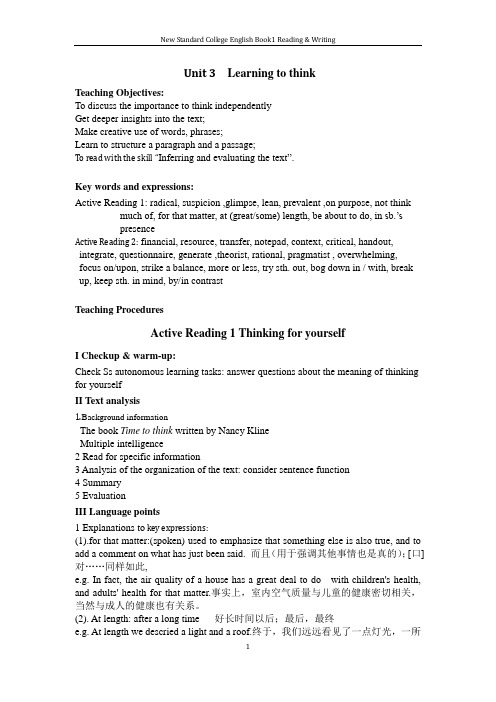
Unit 3 Learning to thinkTeaching Objectives:To discuss the importance to think independentlyGet deeper insights into the text;Make creative use of words, phrases;Learn to structure a paragraph and a passage;To read with the skill “Inferring and evaluating the text‖.Key words and expressions:Active Reading 1: radical, suspicion ,glimpse, lean, prevalent ,on purpose, not think much of, for that matter, at (great/some) length, be about to do, in sb.’spresenceActive Reading 2: financial, resource, transfer, notepad, context, critical, handout, integrate, questionnaire, generate ,theorist, rational, pragmatist , overwhelming, focus on/upon, strike a balance, more or less, try sth. out, bog down in / with, break up, keep sth. in mind, by/in contrastTeaching ProceduresActive Reading 1 Thinking for yourselfI Checkup & warm-up:Check Ss autonomous learning tasks: answer questions about the meaning of thinking for yourselfII Text analysis1.Background informationThe book Time to think written by Nancy KlineMultiple intelligence2 Read for specific information3 Analysis of the organization of the text: consider sentence function4 Summary5 EvaluationIII Language points1 Explanations to key expressions:(1).for that matter:(spoken) used to emphasize that something else is also true, and to add a comment on what has just been said. 而且(用于强调其他事情也是真的);[口]对……同样如此,e.g. In fact, the air quality of a house has a great deal to do with children's health, and adults' health for that matter.事实上,室内空气质量与儿童的健康密切相关,当然与成人的健康也有关系。
新视野英语教程教案book1unit3A

Unit 3 Text AWealth,success or loveⅠObjectiveG o over the whole text in limited time and try to get the main idea ofthe passageG et some information about textⅡTime ArrangementText: 2 periodsDiscussion: 1 periodⅢLeading InIntroduction to the tipicReading and sharing stories with your friends is a fun way of learning.below ,you will find some texts to help get you and your classments started on thinking about the stories in your own lives,read them carefully and answer the questions that come after them.ExploringDo you like interesting stories?what kind of stories do you like most? Have you tried of tell you r classmates your favorite stories? Here we have given you some questions that are related to stories.they are open_ended with no right or wrong answers.Before reading the texts,you may work in pairs and ask each other the questions.What kind of stories do you enjoy reading?P hrases and Expressions1.as well2.out ofeg: I learnt chinese out of interest.3.point to4.fill with/ be filled with5.jump in6.take someone’s advice1.1. People have differing views on this.Meaning: People hold different points of view about this question.2. Some think wealth is more important; some success; othersthink love is the most important of all.Meaning: Some people believe that wealth is more important;some people regard success as more important; other people hold the view that love is most importantsome success = some think success is more important3. But is there a third way?Meaning: But is it possible that a third way exists?4. Could it be possible for a person to choose one and somehowget the other two, as well? (Para.1)Meaning: Could there be a possibility for a person to pick one and get the other two as well by some means?5. A woman came out of her house and saw three wise men withlong white hair sitting in her front garden.Meaning: A woman came out of her house and saw three clever men sitting in her front garden. They all had long white hair.6. Out of sympathy, she said...Meaning: Feeling pity for the old men, she said...7. I don't think I know you, but you must be hungry.Meaning: I don't know any of you, but I'm sure you are hungry.Note that the word "must" indicates that the woman was very sure that the old men were hungry.8. "Is the man of the house at home?" they asked.Meaning: "Is the master/host of the house at home?" they asked.Please notice that the view—the man of the house is the master of the house—is not acceptable to all, at least not to feminists.9. "Then we cannot come in," they replied.Meaning: "In this case, we can't come in," they answered.then = in this case; under this condition10. In the evening when her husband came home, the woman told him exactly what had happened.Meaning: In the evening when her husband came home, the woman told him what had happened, bit by bit.11. "We do not go into a house together," they replied. Meaning: "It's our usual practice that we do not enter a house together," they answered.12. "Why is that?" she wanted to know.Meaning: "What's the reason for your not entering a house together?" she asked for an answer.13. Let him come in and fill our home with wealth!Meaning: Ask him to come in and fill up our house with money and possessions!fill... with.../ be filled with...: make or become full注满;填满;装满The room was filled with laughter and we all had a good time.屋子里充满了笑声,我们都玩得很开心。
- 1、下载文档前请自行甄别文档内容的完整性,平台不提供额外的编辑、内容补充、找答案等附加服务。
- 2、"仅部分预览"的文档,不可在线预览部分如存在完整性等问题,可反馈申请退款(可完整预览的文档不适用该条件!)。
- 3、如文档侵犯您的权益,请联系客服反馈,我们会尽快为您处理(人工客服工作时间:9:00-18:30)。
Para.8 Despite his disability, his father engaged in many activities through his own efforts.
Paras.9-10 What his father did when a fight broke out at a beach party, one more example of a “good heart”.
4) bother
His old injury still bothers him from time to time.
Don’t bother with/about it.
Don’t bother helping/ to help her on my account.
5) coordinate
We must coordinate our efforts to help people who are affected by the flood.
He is ust learn to balance when you learn to ride a bike.
Before you decide to work at home, you must balance the advantages of telecommuting against its disadvantages.
4)conduct a series of reading, listening, speaking and writing activities related to the theme of the unit.
教学重点:
1)text structure analysis
2)language study
3.Background knowledge
Manhattanis an island in New York Bay at the mouth of theHudson River. It’s one of the five boroughs that comprise the City ofNew York. Itis alsoNew York City’s business and cultural center. Manhattan is connected by bridges and tunnels to New Jersey to the west, and three New York City boroughs, the Bronx to the northeast and Brooklyn and Queens on Long Island to the east and south. For more information aboutManhattan, visithttp://en.wikipedia. Org/wiki/Manhattan. You can also take a virtual tour ofManhattanby visitinghttp://www.Lowermanhattan. Info/.
2)Students knowsome background knowledgein the passage;
3)Students catch the main idea of the passage.
Teaching Contents:
1. New words and phrases
1) lean
徐州工程学院教案
20—20学年第学期第周星期
课题名称(含教材章节):College English(NewHorizonCollegeEnglishReading& Writing 1
UnitThree)
教学目的和要求:
1)grasp the main idea (the father’s good heart.) and structure of the text
The plan was not very well coordinated, so it failed.
6)halt
The train halted and had to wait for hours while people worked to repair the line.
The government is taking measures to halt the rise in housing price.
2) balance
Her friend’s death disturbed the balance of her mind.
I found it hard to keep my balance on the icy path/surface.
sense of balance
Riding a bike can help develop a child’s sense of balance.
5.Text organization
Part I (Paras.1-4)
Flashbacks about what the writer can recall of his father
Para.1 the endurance of embarrassment
Para.2 setting a standard for him to adjust to and follow
3)grammatical structures
4)a narrative writing strategy
教学难点:
Let the students keep in mind and make proper use of following words and phrases:
lean
balance
3) severe
His head injuries were quite severe.
Don’t be too severe on him.
She had a severe look on her face.
The bad harvests led to severe food shortage.
Home work :
1)Reviewnew words and phrases in Text A;
2)Previewthe whole passage.
3rdPeriod and 4 period
Teaching Objectives:
Para.3 being hard-working
Para.4 having self-discipline
Part II (Paras. 5-6)
The writer’s own comments
Para.5 The writer feels amazed at the courage for his father to subject himself to such shame and stress, without any complaint.
severe
inward
bother
impatient
adjust
despite
cling
amaze
subject
stress
complaint
envy
engage
occasion
punch
urge
worthy
regret
lean ongrow uplet onstart out
make itmake one’s wayeven thoughbreak out
Para.12 contrast his father’s “good heart” with his own “bad” heart.
Para.13 conclusion: The writer understands what “You set the pace. I will try to adjust to you.” means. This helps him to regain his balance by building up a proper standard to live by.
He paced back and forth ashe was thinking how to solve the problem.
2. Pre-reading Tasks:
Students listen to the recording and do the pre-reading task on page2of their book.
Part IV (Paras. 11-13)
The writer’s own comments and reflections
Para.11 The writer recalls his father’s pride in him. His father was living through his experience.
Para.6 Another example to show his father’s good heart.
Part III (Paras. 7-10)
The writer’s own reflections on what a “good heart” is and more examples
Para.7 The writer’s own reflections on what a “good heart” means.
2)learn different writingskills demonstrated in the text(exemplification, metaphor, flashback.)
